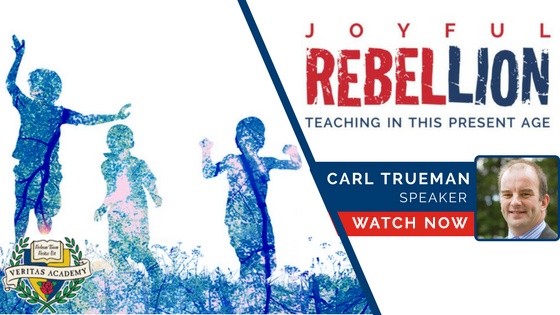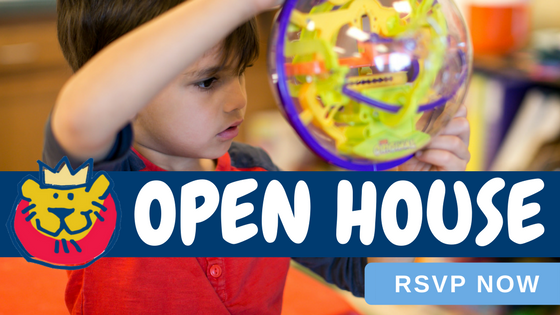Is school fun?
No really, do you remember school being fun for you? Did you spring out of bed Monday mornings, excited for all the adventures that awaited in your classrooms and beyond? Did the last day of school bring tears of sadness to your eyes (like it did for my first-grade son)?
Or, did you dread the end of weekends and summer vacation with a knot in your stomach about the drudgery of structured hours filled with instructional ho-hum?
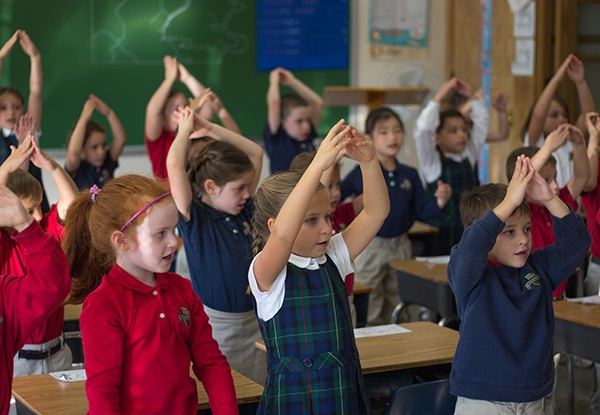 For many of us, we may have begun in the first category in early elementary school, then transitioned into the latter somewhere in our middle school years. School stopped being fun, and became stressful, boring, and exhausting.
For many of us, we may have begun in the first category in early elementary school, then transitioned into the latter somewhere in our middle school years. School stopped being fun, and became stressful, boring, and exhausting.
Does it have to be that way? Is this the best we can expect?
Sure, all of life can’t be fun and games. We all eventually must work for our living, and we all must buckle down for the occasional (or frequent) unpleasant or difficult task.
But school is about learning. And learning, my friends, should ALWAYS be fun. I don’t mean all play and no work. I don’t mean watering down subjects and curriculum with activities simply to “add” fun. I’m talking about extracting the truly amazing, marvelous, and, yes, fun elements of all that we are learning and teaching. All subjects that we study in school are full of wonder as they were derived from a wonderful God, and we see it as our goal to teach these “fun” truths to our students to the end that they will appreciate the natural joy to be had in all of learning.
My guess is that many of your younger kids do find great joy in school and learning. How do we foster that spirit, capture that enthusiasm, and propel it forth into their adolescent, teen, and adult years?
Here at Veritas, we value fun. We value it so much that our classrooms and hallways can get downright zany sometimes, and that goes for our high school, too!
That may come as a surprise to those unfamiliar with our school. You see the uniforms, the classical education model, the respect we model for teachers and administrators, and you may imagine Veritas school days as stuffy and somber.
Not so much.
Take the scene that unfolded a couple of weeks ago on Shrove Tuesday, where our secondary students dressed in outlandish homemade costumes, put on a parade and performance of epic proportions, and competed in a wild pancake race for an Aunt Jemima trophy and a ruffled carrot apron. All of this was in the name of celebrating a centuries-old observance that has, over time, evolved into a beloved and hilarious school tradition for which discussions and preparations begin weeks - or even months - in advance.
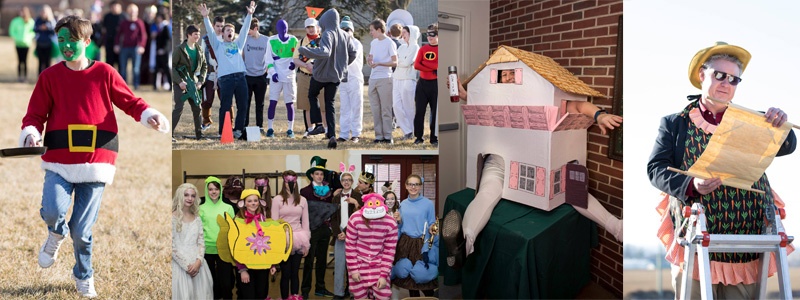
These images may be an odd juxtaposition against one’s notions of a private classical Christian school - especially one that values and espouses such a rigorous academic program.
What purpose does Shrove Tuesday - and all of those other big and small traditions of fun and joy - serve in instilling the vital knowledge in students that today’s world will require of them? How does silliness translate into the serious business of learning? In this world of standardized tests, achievement benchmarks, and performance expectations, who has time for pomp and parades?
If your children - no matter their age - aren’t having fun with learning, then their chances of not only retaining today’s knowledge but also thirsting for more knowledge as they grow are greatly diminished. If we’re going to raise a generation that loves to learn, think critically, explore concepts, engage discussion, and listen to ideas, then we as parents and teachers must help them see the joy in learning.
If your child is not yet in school, you can begin this now in your everyday conversations and activities - you are, after all, their first and most important teacher. If your child is in school, then I encourage you to look at these principles and discern whether their classroom environment fosters the type of fun that in turn fosters the best learning.
Here are three compelling reasons that your child’s learning should incorporate fun:
1. Our brains are wired that way
A telling article in the Washington Post once examined the evidence for why having fun is conducive to our brains retaining knowledge.
In the article the author quotes neurologist and educator Judy Willis’s book “Research-Based Strategies to Ignite Student Learning: Insights from a Neurologist and Classroom Teacher” as saying:
The human brain and body respond positively to laughter with the release of endorphin, epinephrine (adrenaline), and dopamine, and with increased breathing volume (more oxygen). When a lesson starts with humor, there is more alerting, and the subsequent information is attached to the positive emotional event as an event or flashbulb memory.
 Optimal brain activation occurs when subjects are in positive emotional states or when the material holds personal meaning, connects to their interests, is presented with elements of novelty, or evokes wonder. This is why attentiveness is so closely linked to positive emotional cueing and personal meaning. When there is connection to prior knowledge or positive emotional experience, new information passage through the limbic system will be enhanced. The thalamus will then “decide” to pay attention to the information.
Optimal brain activation occurs when subjects are in positive emotional states or when the material holds personal meaning, connects to their interests, is presented with elements of novelty, or evokes wonder. This is why attentiveness is so closely linked to positive emotional cueing and personal meaning. When there is connection to prior knowledge or positive emotional experience, new information passage through the limbic system will be enhanced. The thalamus will then “decide” to pay attention to the information.
The pressure to rise to the benchmarks of the standardized tests and to always perform and produce, without allowing for moments of humor and laughter, is counterproductive for classrooms and students. You’ll find it works the same way in your day to day activities with your child. Make it fun, and they’ll make the connection.
2. Sense of community (it’s not just about “me”)
Leslie Bustard, Upper School Humanities and Writing teacher and International Student Coordinator, has realized the value of creating a sense of community in school.
 “I think it is really easy, even as Christians, to cultivate in our children an ‘It’s all about me’ mentality," Leslie says. "The pursuit of excellent grades and involvement in so many extra curricular activities can, unintentionally, make us/them live individualistically. So, even though we want to pursue a life that is glorifying to God, many times we are so wrapped up in our own and our children’s own successes and activities that we end ‘glorifying’ our kids and our lives. We miss out on the actual practices of making community living and traditions a vital part of who we (and our community) are becoming.”
“I think it is really easy, even as Christians, to cultivate in our children an ‘It’s all about me’ mentality," Leslie says. "The pursuit of excellent grades and involvement in so many extra curricular activities can, unintentionally, make us/them live individualistically. So, even though we want to pursue a life that is glorifying to God, many times we are so wrapped up in our own and our children’s own successes and activities that we end ‘glorifying’ our kids and our lives. We miss out on the actual practices of making community living and traditions a vital part of who we (and our community) are becoming.”
While Leslie clarified that she doesn’t see the pursuit of excellent grades or extracurricular activities as a bad thing (after all, she is our theater department producer and she greatly values excellence in academia), she simply feels that it can become all encompassing to the point that we are blinded to the joys and needs around us.
“Being part of a community - rooted in a place and with certain people - is very God-honoring. He calls us to live our lives with others. These traditions at our school, which include a lot of laughter and out-of-the box activities, can help us get outside of ourselves and our own pursuits, and help us see the joy of doing life with others.”
3. Better classroom management and behavior
Our upper school math and physics teacher, Shaelyn Baas, knows the potential for drudgery in the school day, and how it can hinder a student’s ability to process.
“The school day can be long. Lessons can get tedious and tiring. Math problems can seem impossible,” she says. “In some ways, students must learn the discipline of listening even when they are not interested in chemical reactions, and they must give their best effort even when they couldn’t care less about quadratic functions.
“Yet any time I can involve gummy bears, slinkies, or bottle rockets in a physics lesson, I jump on it! Students are more engaged and ready to learn when they are motivated to take an interest. Especially as a teacher, I enjoy being in the classroom when students seem like they're having fun and are interested in learning. Even a relay race or game of bingo can encourage students to enjoy practicing math concepts through some friendly competition.”
 The American Academy of Pediatrics agrees that breaks in classroom intensity - specifically allowing for recess - are an absolute necessity for kids and schools. And studies have shown that kids’ learning suffers when playtime is siphoned away.
The American Academy of Pediatrics agrees that breaks in classroom intensity - specifically allowing for recess - are an absolute necessity for kids and schools. And studies have shown that kids’ learning suffers when playtime is siphoned away.
“Children need to have downtime between complex cognitive challenges,” the article quotes Dr. Robert Murray as saying. “They tend to be less able to process information the longer they are held to a task. It’s not enough to just switch from math to English. You actually have to take a break.”
This certainly seems counterproductive to what Common Core and the new era of standardized testing and performance requirements are prescribing, as schools around the country are reducing recess in favor of more time at desks. It’s interesting to note that at Veritas, it’s not unheard of for our younger elementary kids to have more than one recess per day (even heading outside with sleds if there's snow on the ground!), and still our test scores remain consistently higher than state averages, our graduates are accepted into highly regarded colleges, and our students who continue in our curriculum from elementary through high school are significantly ahead of the curve in math and language arts.
And finally, here are three ways that fun can be incorporated into learning:
1. Rules & Traditions
For most people, when they think about math, “fun” is not the first word that comes to mind. But our upper school math teacher, Dale Siegenthaler, begs to differ. Why? Because, he says, “When I think about fun in mathematics, fun in learning, or fun in general one of the first things I think about is rules. This might seem counterintuitive at first, but here is my thesis: Rules create fun.”
Rules are fun? Dale explains further:
“When you decide to play a game with friends, the first thing you have to do is explain the rules. No rules, no fun. Mathematics is full of rules. Some of these rules are made up, some of the rules follow from earlier rules. These rules are the very things that allow for creativity in mathematics to happen.
“I think it is absolutely false that rules stifle creativity. Rules in music, rules in art, rules in mathematics, rules in a classroom, are one of the most important things to create an environment where creativity and joyful learning can take place.”
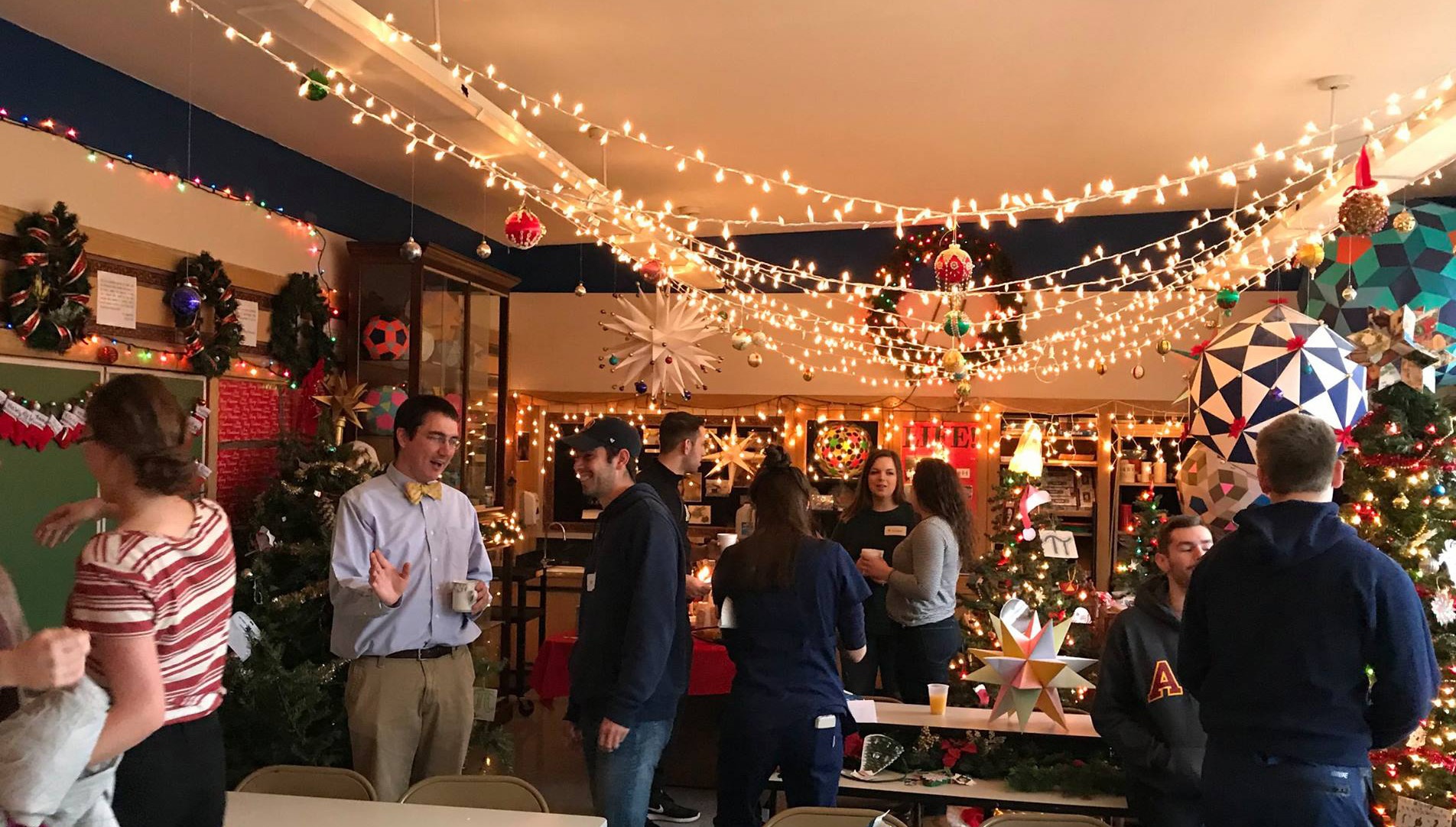 Mr. Siegenthaler’s traditions go beyond the beauty of rules in his actual mathematics curriculum. From the decor in his classroom (his Christmas lights were so superfluous that they shorted out our schools electric circuit!) to his feasts and parties, he has established quite a reputation for himself.
Mr. Siegenthaler’s traditions go beyond the beauty of rules in his actual mathematics curriculum. From the decor in his classroom (his Christmas lights were so superfluous that they shorted out our schools electric circuit!) to his feasts and parties, he has established quite a reputation for himself.
He recalls reading a quote years ago that stuck with him that went something like this: “Traditions are unimportant rules that we create to protect the most important things in life.”
“Fun and quirky traditions that we have at our school are not in and of themselves important,” Mr. Siegenthaler notes. “However, the expectation of these annual traditions puts us in a rhythm where the important things like camaraderie between different grade levels, knowledge of mathematics history, and celebration of Christian holidays are preserved. Following the traditions established in festivals and holidays creates a connection to centuries of great Christian teaching and living.
“Most of my traditions and rules also involve food. Traditions involving food, especially good food, help create expectation and excitement. I am pretty sure we celebrate and eat a lot more food than most schools. We have at least 100 different pies brought in on Pi day! I’m very thankful to teach at a school like Veritas where I am free to teach joyfully and shine a light on the beautiful truths of mathematics and Christian traditions. They can speak for themselves if teachers are allowed to show them for what they really are.”
So, hold fast to your families’ traditions - or create your own as you go - no matter how quirky they may be! These memories will help cement important moments in your child’s mind for years to come.
2. Excitement & Passion
How many high school students can say that they think calculus is exciting? You may be surprised to know that several Veritas students and alumni would consider it so, if even just a little bit.
Senior Maddy Fischer told me, “Calculus itself may not have been fun otherwise, but it’s exciting because Mr. Siegenthaler is excited about it.”
 Mr. Siegenthaler, with all his rules and traditions, is passionate about the beauty and wonder that the concepts of advanced mathematics and calculus create. He draws students into the geometric complexities of polyhedra, so much so that several take a week (or more) out of their summers to attend a camp with him where they design and build their own, proudly on display in Mr. Siegenthaler’s classroom.
Mr. Siegenthaler, with all his rules and traditions, is passionate about the beauty and wonder that the concepts of advanced mathematics and calculus create. He draws students into the geometric complexities of polyhedra, so much so that several take a week (or more) out of their summers to attend a camp with him where they design and build their own, proudly on display in Mr. Siegenthaler’s classroom.
Passion captivates. It’s contagious. If you’re excited about a subject, share that passion with your child. While they might not grow up to pursue the same hobbies or career as you, they will likely have a greater appreciation for what they learned from your passion.
Likewise, a teacher who is passionate about the subjects they’re imparting will often pass that excitement on to their students!
3. Breaks in Intensity
Mary Poppins said it best in the famous ditty, A Spoonful of Sugar: “In every job that must be done there is an element of fun. You find the fun, and - snap! - the job’s a game!”
Just as Shaelyn Baas incorporates sweets and games in her math and physics classes, taking a breather from the heaviness of a task to add some amusement is just the “spoonful of sugar” needed to help “the medicine go down.”
Even if you’re not teaching a classroom of teenagers physics and logic, you can incorporate these principles with your little ones by adding fun learning opportunities in your day. Make a trip to the grocery store a blast by having a competition for who can find the most items that begin with a certain letter. Learn fractions while you get messy cooking together in the kitchen (and don’t be afraid to play in the flour or splash in the dish soap bubbles!). Encourage reading while you’re on the road by making a game of seeing who can come up with the most words that rhyme with street names that you pass.
After all, as Shaelyn notes, “Every lesson does not lend itself to gummy bears and bingo, and and if it did, they wouldn't seem so special anymore! But fun traditions, even in the classroom, can foster a joy of learning that will benefit students for a lifetime.”
Continue this discussion with us at our "Joyful Rebellion" lecture on Thursday night, March 8, presented by author, theologian, and Westminster Theological Seminary professor Dr. Carl Trueman, 7:00 pm at Westminster Presbyterian Church. Click the link below to RSVP for this free event!



